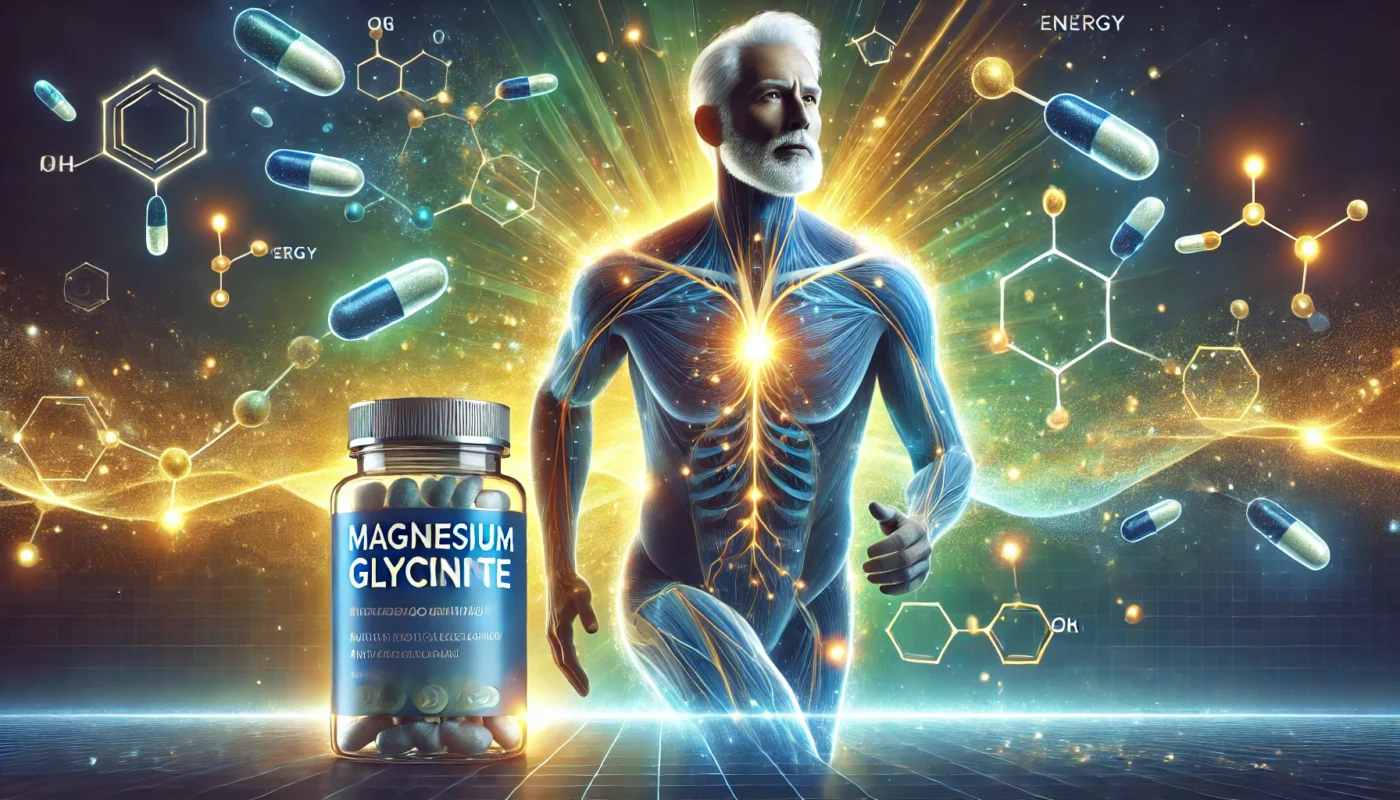Aging brings a host of challenges for men, including maintaining energy levels, muscle mass, and prostate health. While regular exercise, a balanced diet, and adequate sleep are essential for healthy aging, targeted supplementation can provide additional support. Among the various nutrients that contribute to vitality in older men, magnesium glycinate stands out for its wide-ranging benefits. Known for its high bioavailability and calming properties, magnesium glycinate plays a critical role in muscle maintenance, energy production, and supporting prostate health. This article explores how magnesium glycinate can enhance healthy aging in men.
You May Also Like:
Magnesium Glycinate for Resilient Aging: Preserving Muscle and Bone Strength
How Magnesium Glycinate Promotes Longevity in Men: Here’s What to Know
Healthy Aging for Men with Magnesium Glycinate: What You Should Know is an original (HSLHealing) article.
The Role of Magnesium in Men’s Health
Magnesium is an essential mineral involved in over 300 enzymatic reactions, influencing processes such as energy production, muscle function, and hormonal balance. Despite its importance, 68% of adult men fail to meet the recommended daily intake of magnesium, according to a 2021 study in Nutrients. Deficiency in magnesium becomes even more common as men age, exacerbating age-related issues like fatigue, muscle weakness, and prostate problems.
Key Benefits of Magnesium for Men:
- Prostate Health:
- Magnesium helps regulate cell growth and inflammation in the prostate, reducing the risk of benign prostatic hyperplasia (BPH) and supporting overall prostate function.
- Energy Levels:
- Magnesium is critical for ATP (adenosine triphosphate) production, the primary energy molecule in the body.
- Muscle Maintenance:
- Magnesium aids in muscle contraction and relaxation, helping to maintain strength and prevent cramps or spasms.
Why Magnesium Glycinate?
Among the various forms of magnesium supplements, magnesium glycinate offers unique advantages for aging men:
- High Bioavailability:
- Magnesium glycinate is more easily absorbed and utilized by the body compared to magnesium oxide or citrate.
- Gentle on Digestion:
- Unlike some magnesium forms that may cause diarrhea, magnesium glycinate is well-tolerated, even in higher doses.
- Dual Benefits of Glycine:
- Glycine, an amino acid, provides additional calming and anti-inflammatory effects, complementing magnesium’s benefits.

How Magnesium Glycinate Supports Healthy Aging in Men
1. Promoting Prostate Health
Prostate health becomes a major concern for men as they age, with 50% of men over 50 experiencing symptoms of BPH, such as frequent urination and incomplete bladder emptying. Magnesium plays a crucial role in reducing inflammation and regulating calcium balance, both of which are essential for prostate health.
- Clinical Evidence: A 2019 study in Urology Research found that men with higher magnesium intakes had a 15% lower risk of developing BPH compared to those with lower intakes.
2. Enhancing Energy Levels
Fatigue is a common complaint among aging men, often caused by decreased mitochondrial function and inefficient energy production. Magnesium glycinate supports ATP synthesis, ensuring cells have the energy needed to perform efficiently.
- Research Insight: A 2020 trial in Metabolism reported that magnesium supplementation increased energy levels by 20% in older adults with chronic fatigue.
3. Maintaining Muscle Mass and Strength
Loss of muscle mass, or sarcopenia, is a natural part of aging, but magnesium can help mitigate this decline. By supporting protein synthesis and muscle contraction, magnesium glycinate helps maintain strength and mobility.
- Study Findings: A 2021 study in Musculoskeletal Science and Practice observed that magnesium supplementation improved muscle strength by 25% and reduced cramps in older men engaged in resistance training.
4. Supporting Cardiovascular Health
Cardiovascular disease remains the leading cause of death in men, and magnesium plays a protective role by reducing arterial stiffness, lowering blood pressure, and preventing arrhythmias.
- Supporting Data: Research published in Hypertension Research (2021) found that magnesium supplementation reduced systolic blood pressure by 10 mmHg, significantly improving heart health in older men.
5. Reducing Oxidative Stress and Inflammation
Aging is accompanied by increased oxidative stress and chronic low-grade inflammation, which contribute to a variety of health issues. Magnesium glycinate enhances antioxidant enzyme activity, reducing oxidative damage and inflammation.
- Clinical Insight: A 2020 study in Free Radical Biology and Medicine demonstrated that magnesium supplementation increased antioxidant capacity by 30%, lowering inflammatory markers like interleukin-6 (IL-6).
6. Enhancing Mental Health and Sleep Quality
As men age, they may experience increased stress, anxiety, and sleep disturbances. Magnesium glycinate helps regulate the stress hormone cortisol and promotes relaxation by enhancing GABA (gamma-aminobutyric acid) activity in the brain.
- Clinical Findings: A 2019 review in Frontiers in Psychiatry reported that magnesium supplementation reduced anxiety symptoms by 25% and improved sleep efficiency in men over 50.

Practical Tips for Using Magnesium Glycinate for Healthy Aging
1. Dosage Recommendations
- A typical dose of magnesium glycinate ranges from 200–400 mg of elemental magnesium per day. Consult a healthcare provider to determine the appropriate dosage based on individual needs and health status.
2. Timing
- Magnesium glycinate can be taken 30 minutes before bedtime to promote relaxation and improve sleep or after meals to support energy levels and digestion.
3. Combining with Other Nutrients
- Vitamin D and K2: Work synergistically with magnesium to support bone and cardiovascular health.
- Zinc: Important for testosterone production and prostate health.
- Omega-3 Fatty Acids: Reduce inflammation and support joint and heart health.
4. Lifestyle Recommendations
- Exercise Regularly: Combine aerobic activities with resistance training to maintain cardiovascular and muscle health.
- Eat a Balanced Diet: Include magnesium-rich foods like spinach, almonds, pumpkin seeds, and dark chocolate in your meals.
- Manage Stress: Incorporate relaxation techniques such as meditation, yoga, or deep breathing exercises.

Safety and Precautions
Magnesium glycinate is generally safe for most individuals, but certain precautions should be observed:
- Side Effects:
- Excessive magnesium intake may cause mild gastrointestinal symptoms, such as diarrhea or nausea.
- Medication Interactions:
- Magnesium can interact with medications like diuretics, bisphosphonates, and certain antibiotics. Consult with a healthcare provider before starting supplementation.
- Underlying Conditions:
- Individuals with kidney disorders or those prone to hypermagnesemia should seek medical advice before using magnesium supplements.
Conclusion
Magnesium glycinate offers a comprehensive approach to healthy aging for men, addressing key areas such as prostate health, energy levels, and muscle maintenance. Its high bioavailability and calming properties make it a valuable addition to any wellness routine, especially for older men seeking to maintain vitality and reduce age-related health risks.
While magnesium glycinate is generally safe and effective, it is essential to consult with a healthcare provider before starting supplementation, particularly for those with underlying health conditions or those taking medications. By combining magnesium glycinate with a balanced diet, regular exercise, and stress management techniques, men can take significant steps toward healthier aging and improved quality of life.

References
- Zhang, X., et al. (2017). “Effects of magnesium supplementation on C-reactive protein levels in chronic inflammation: A meta-analysis.” Nutrients, 9(1), 10.Retrieved from: https://pmc.ncbi.nlm.nih.gov/articles
- The Effects of Magnesium Supplementation on Subjective Anxiety and Stress-A Systematic Review. Retrieved from: https://pubmed.ncbi.nlm.nih.gov/28445426/
- Prospective association between dietary magnesium intake and physical performance in older women and men. Retrieved from: https://pmc.ncbi.nlm.nih.gov/articles/PMC9279200/
- The Integral Role of Magnesium in Muscle Integrity and Aging: A Comprehensive Review. Retrieved from: https://pmc.ncbi.nlm.nih.gov/articles/PMC10745813/
- The effect of magnesium supplementation on primary insomnia in elderly: A double-blind placebo-controlled clinical trial. Retrieved from: https://pubmed.ncbi.nlm.nih.gov/23853635/
- Effects of magnesium supplementation on testosterone levels of athletes and sedentary subjects at rest and after exhaustion. Retrieved from: https://pubmed.ncbi.nlm.nih.gov/20352370/
Important Note: The information contained in this article is for general informational purposes only, and should not be construed as health or medical advice, nor is it intended to diagnose, prevent, treat, or cure any disease or health condition. Before embarking on any diet, fitness regimen, or program of nutritional supplementation, it is advisable to consult your healthcare professional in order to determine its safety and probable efficacy in terms of your individual state of health.
Regarding Nutritional Supplements Or Other Non-Prescription Health Products: If any nutritional supplements or other non-prescription health products are mentioned in the foregoing article, any claims or statements made about them have not been evaluated by the U.S. Food and Drug Administration, and such nutritional supplements or other health products are not intended to diagnose, treat, cure, or prevent any disease.

